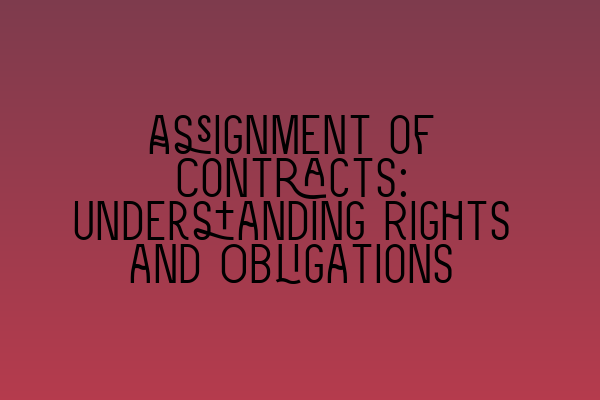Assignment of Contracts: Understanding Rights and Obligations
Welcome to our blog post on the assignment of contracts. In this article, we will explore the concept of assignment, delve into the rights and obligations involved, and provide insights into the legal framework surrounding this practice. Whether you are a solicitor, a law student preparing for the SQE 1 exam, or someone interested in contract law, this post aims to provide you with a comprehensive understanding of assignment.
But before we dive into the intricacies of assignment, let’s briefly explain the basics of contract law. A contract is a legally binding agreement between two or more parties. It outlines the rights and obligations of each party and governs their interactions. Contracts can take various forms, such as written, verbal, or implied, and cover a wide range of agreements, from simple transactions to complex business deals.
Assignment, in the context of contract law, refers to the transfer of contractual rights and obligations from one party (the assignor) to another party (the assignee). Assignments can occur for various reasons, such as the need for financial flexibility, the desire to delegate certain responsibilities, or the transfer of ownership in a business context.
Let’s explore the rights and obligations involved in assignment:
Rights of the Assignor
The assignor retains certain rights even after the assignment of a contract. These rights typically include the right to claim damages in case of a breach by the other party and the right to enforce any warranties that arose before the assignment. However, it’s important to note that the assignor’s rights may be limited depending on the specific terms and conditions of the assignment agreement.
For a more comprehensive understanding of SQE 1 exam questions related to contract law, check out our SQE 1 Practice Exam Questions article. It provides invaluable practice resources to help you prepare for the exam.
Obligations of the Assignor
By assigning a contract, the assignor transfers their obligations to the assignee. The assignor is no longer responsible for fulfilling the contractual obligations outlined in the agreement. However, it’s crucial for the assignor to ensure that the assignee is capable and willing to fulfill these obligations. If the assignee fails to meet their obligations, the assignor may be held liable for the assignee’s actions or inactions, depending on the circumstances and the terms of the assignment agreement.
For those seeking to practice SQE 1 mocks and further enhance their contract law knowledge, take a look at our SQE 1 Practice Mocks FLK1 FLK2 article. It offers comprehensive practice materials to help you familiarize yourself with the exam format.
Rights of the Assignee
Upon receiving an assignment, the assignee acquires the rights associated with the contract. These rights include the right to receive the benefits outlined in the agreement, such as payments or services. However, the assignee must ensure that they meet their own obligations under the contract in order to enjoy these rights fully.
If you’re preparing for the SQE 2 exam or looking for ways to enhance your SQE 2 preparation, our SQE 2 Preparation Courses provide comprehensive resources designed to improve your chances of success.
Obligations of the Assignee
As the new party to the contract, the assignee assumes the obligations previously held by the assignor. They are legally bound to fulfill the contractual obligations and perform any duties specified in the agreement. The assignee must also be aware of any limitations or restrictions that may be outlined in the assignment agreement.
If you’re interested in learning more about SQE 1 preparation courses and how they can help you succeed in the exam, visit our SQE 1 Preparation Courses page. Our courses are designed to provide you with the knowledge and skills necessary to excel in the exam.
In conclusion, understanding the rights and obligations involved in the assignment of contracts is crucial for both solicitors and law enthusiasts. By grasping the intricacies of assignment, you can navigate the legal landscape with confidence and ensure you protect the interests of your clients or yourself. Remember to stay updated with the latest SRA SQE exam dates by visiting our SRA SQE Exam Dates article.
Thank you for reading! We hope this article has provided you with a comprehensive understanding of assignment of contracts and its implications in contract law.
